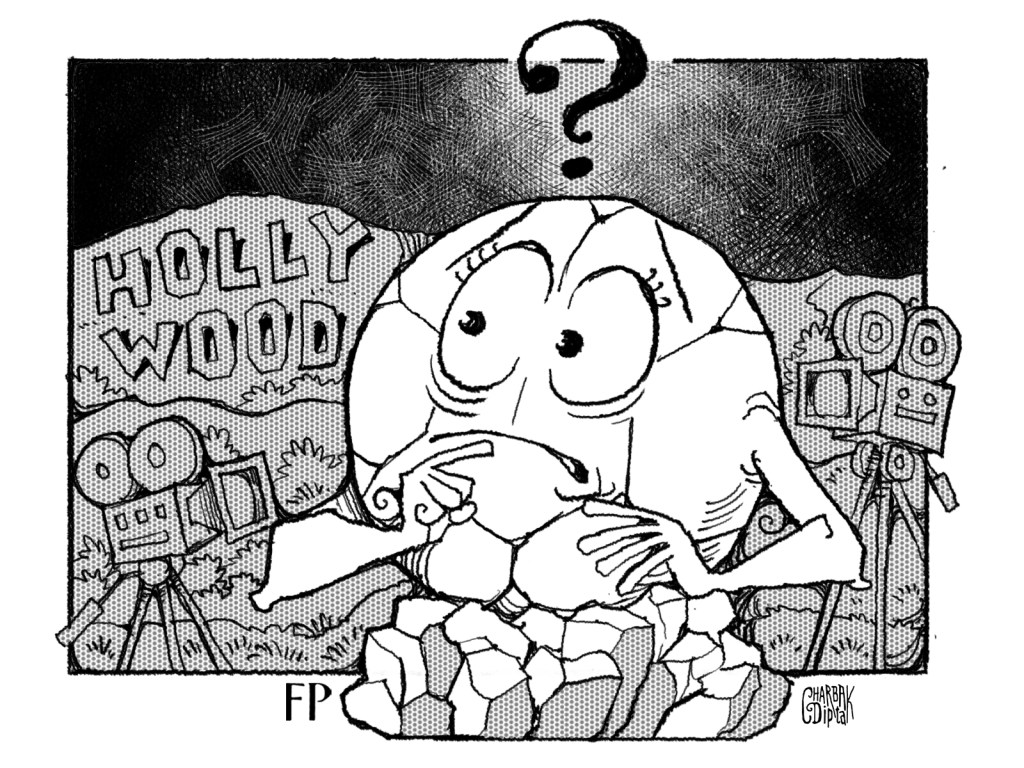If Monday’s Ballon d’Or gala was a scene from a movie, the art director would get an Oscar. A red carpet entry to the breathtaking Théâtre du Châtelet. Dark tuxedos, beige upholstery, and golden light bouncing off walls. Everywhere you looked, there was football royalty, current and past. Some music in the background; Didier Drogba playing host. The aesthetics for football’s annual Hollywood-impersonation theme party were curated to perfection.
The ceremony is packaged as a celebration of the sport. One of football’s two big nights—along with FIFA’s The Best—that crowns the most impressive performances from the past year. Like with the Oscars, these awards are not limited to the lead protagonists either. There are categories for Club of The Year and Coach of The Year too. After every award, winners get to give speeches and answer quirky questions placed by the hosts of the evening.
There is, however, a key element missing: suspense. Within the game’s observers, the winners can be guessed with a fair degree of confidence. Every year, the Ballon d’Or honour list is predictable to the extent that no one really knows what the awards mean.
Who else could be given Club of The Year but Manchester City, after winning three major trophies in one season while battling the splitting headache from 115 financial charges against them? Inspirational stuff. As a side note, Union Berlin, with a shoestring budget, have made their way into the Champions League. Brighton, after losing their coach and two talismanic players within six months, recovered and made it to the Europa League.
Similarly, everyone has known about Lionel Messi winning his eighth Ballon d’Or from the moment Gonzalo Montiel placed his penalty past Hugo Lloris in the World Cup final. Even if the season wasn’t even halfway through, Messi’s contention was never going to be under threat. In fairness, one can’t begrudge Messi much after his performances at the World Cup. But maybe a question ought to be asked about what exactly the Ballon d’Or rewards. What are the key criteria? If it rewards sustained brilliance over the past 365 days, how has Messi won it on the back of one insane month? If it rewards the best footballer on the planet, then why has Messi not won it every year since he came into his own under Pep Guardiola?

In 2022, the magazine France Football, creators and organisers of the Ballon d’Or, announced that the period of consideration has been changed from a calendar year to a European football season, which operates between August and May. The evaluation criteria this year—one can only be so certain of continuity—prioritises class and character over more individualistic, but objective, metrics like goals and assists. A jury of 100 journalists, one each from FIFA’s top-100 ranked nations, were given thirty nominees to choose their top three from.
Between Lionel Messi’s dribble past half of the Dutch defence to set up Nahuel Molina and Kylian Mbappe’s volley in the 81st minute of the final, which one is classier? You tell me.
The lines between individual excellence and collective success have blurred a bit over the last decade. Ever since Messi and Cristiano Ronaldo cast themselves out as extraterrestrials who did not have to deal with banal things like variance in form, football has veered towards a more individualistic pursuit. The El Clasico was billed as Messi vs Ronaldo more than Barcelona vs Real Madrid. It helped that they were playing for two of the best club teams in Europe and two heavyweight international teams in Argentina and Portugal respectively. The roads to the award ceremony were more jagged too, with organisers in turmoil figuring out who to place the crown on. Take 2014, for example. Real Madrid won the Champions League; Argentina lost the World Cup final by one goal. Both underperformed in their respective title matches. Neither won the league. Manuel Neuer, Philip Lahm, and Thomas Muller, however, won the Bundesliga, the DFB Pokal, and the World Cup. As the vote counts for the Ballon d’Or rolled in, Cristiano finished with 37.66%, Messi had 15.76% and Neuer 15.72%.
If an objective argument can be had, all three of John Stones, Rodri, and Erling Haaland had as good a season in 2022-23 as Messi, if not better. There have been other seasons, many in fact, when no other male footballer in the world was doing what Messi was with even half the consistency. Antoine Griezmann had an exceptional season, including a spectacular World Cup where he was a pivot for France, but he found himself in the 21st position after the voting.
In sports, medals and awards have origins in Olympic events. The Ancient Olympics awarded a precious olive wreath exclusively to the winner; the modern games adopted the current format of gold, silver, and bronze medals. These colours are a direct reference to the first three Ages of Man in Greek mythology. The Golden Age, when men lived amongst Gods; the Silver Age, of prolonged youth; and the Bronze Age, when heroes were made. Awards like the Ballon d’Or, which players cherish and observers often use as a marker of excellence, should come with that weight of history and tradition. It should mean more than the tag of the footballer who had the best vibes that year.
Probably the biggest symbol of the futility of the night could be found in the audience. On Sunday, sat amongst those who have lit up the world’s most popular sport, was a YouTube streamer who once put on a dog collar and gave himself electric shocks while broadcasting live to his audience. Given that this gala was an invite-only ceremony, it isn’t hard to guess how IShowSpeed found a seat inside.
That, there, is the closest one can get to understanding what the Ballon d’Or award night means. An opulent party that makes a mockery of the weight of a gold medal.


















